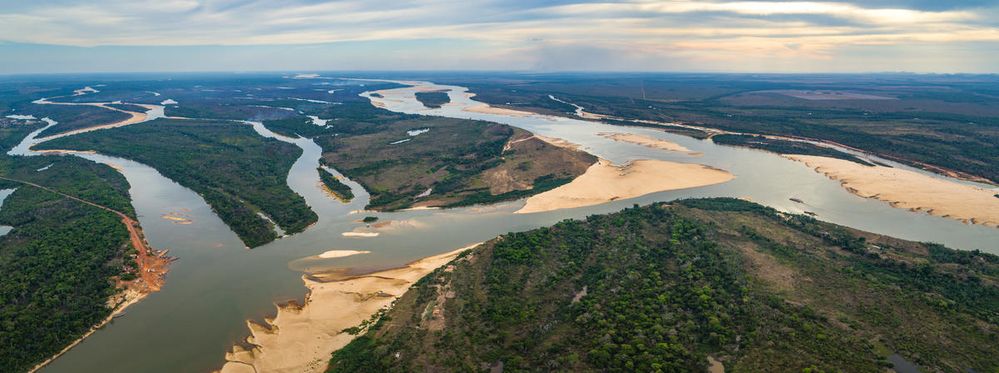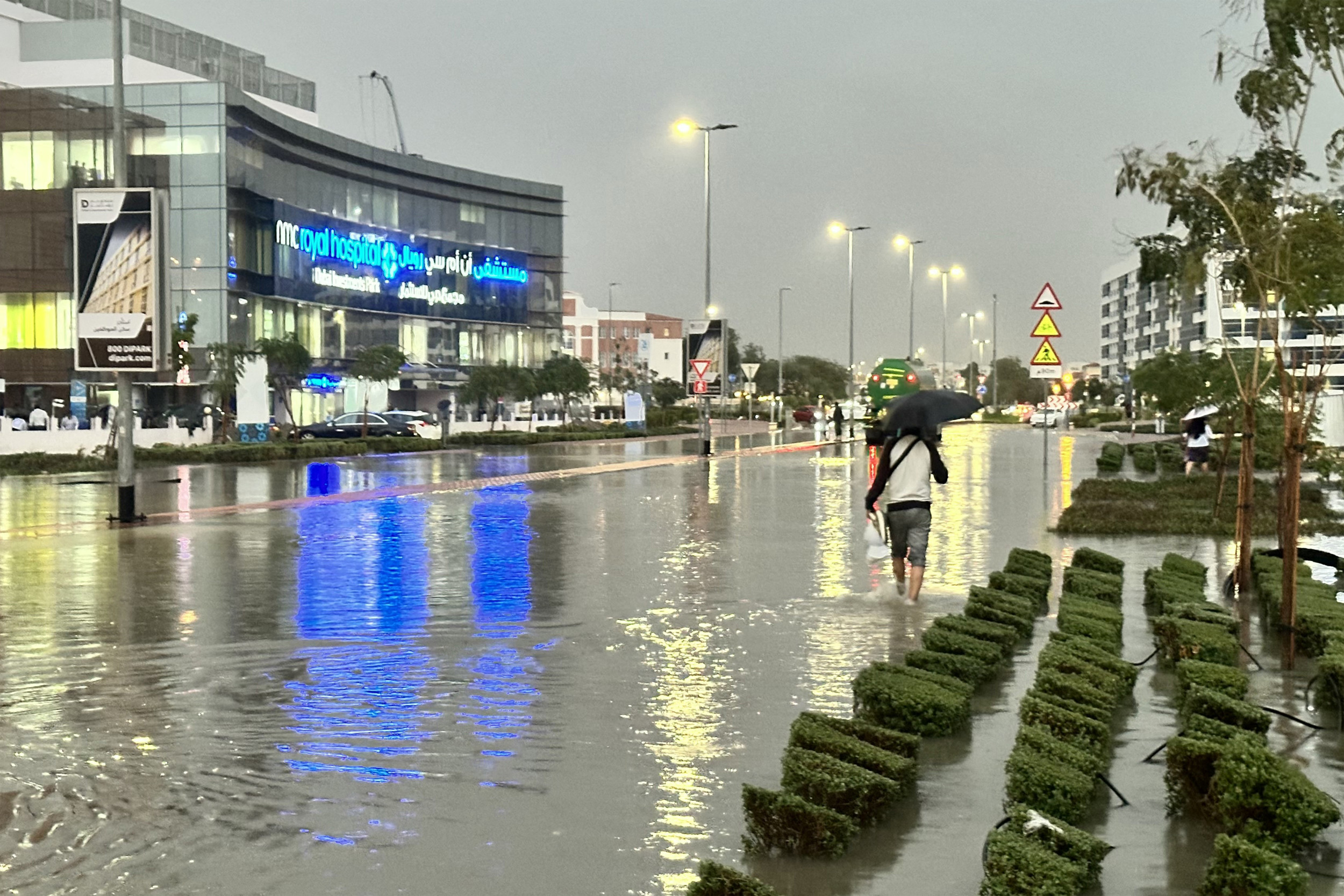
Only about a third of the world's 246 longest rivers—those with a length greater than 600 miles—remain "free-flowing," revealing the extent to which humans are having an impact on the vital waterways that are the lifeblood of our planet, according to an international team of researchers.
For a landmark study published in the journal Nature, experts from the World Wildlife Fund (WWF) and other institutions assessed around 7.5 million miles of rivers across the planet using satellite imagery, creating the first-ever map of the location and extent of those which are still free-flowing.
"A free-flowing river is [one that is] largely unaffected by human-made changes to its flow and connectivity. Water, silt, and fish can move along unobstructed," Michele Thieme, an author of the study from WWF, told Newsweek.
Among the results, the team also found that only 21 of the 91 long rivers which were once connected to the ocean still retain a direct connection from source to sea. Furthermore, they say that long free-flowing rivers are largely absent from the mainland United States, Mexico, Europe and the Middle East, as well as parts of India, southern Africa, southern South America, China and much of Southeast Asia and southern Australia.
In fact, the planet's remaining free-flowing rivers (FFRs) are now mostly restricted to remote regions of the Arctic, the Amazon Basin, and the Congo Basin, as well as a few areas in Southeast Asia.
"Free-flowing rivers are among the most important freshwater habitats in terms of biodiversity and ecosystem services," Thieme said. "They provide abundant fisheries that feed millions, nutrients to downstream floodplains and agriculture, sediments that help stop deltas from sinking, refuges for biodiversity in a rapidly changing world, and healthy wetlands that act as a buffer against extreme weather events."
But despite their importance to both humans and the environment, the authors demonstrate that economic development around the world is making them increasingly rare. Among the biggest contributors to the loss of river connectivity is the construction of infrastructure, such as dams and reservoirs.
Worryingly, the researchers estimate that there are roughly 2.8 million dams around the world, with more than 60,000 planned for construction.
"Infrastructure is the biggest culprit in interfering with the flow of a river," Bernhard Lehner, an author of the study from McGill University in Montreal, Canada, told Newsweek. "Our study showed that the main reason why rivers are not free-flowing anymore is the construction of dams. We built hundreds of thousands of dams worldwide for many purposes, ranging from hydropower to irrigation, water supply and flood control. All those structures impede free-flowing rivers."
"But it is not only dams. Rivers are also affected by other infrastructure measures, such as settlements, roads or levees being built in floodplains, thus disconnecting the river channel from its natural flooding area," he said. "Excess extraction of water for human purposes—such as irrigation—can also cause the river to fall dry and thus create a break in its natural connectivity."
According to Lehner, some previous studies have concluded that more than half of the large river systems of the world are fragmented in one way or another. But those studies typically only looked at a few hundred very large river basins, whereas the latest paper includes all types of rivers, large or small.
"Our results show an even lower number of remaining large free-flowing rivers than those previous studies," he said. "This is not entirely surprising, but quite concerning nonetheless, as it indicates a downward trend of more and more rivers being affected by dams and other infrastructure that impede them from flowing freely and uninterrupted."
The researchers also found that the degree of river connectivity increases with decreasing river length. A total of 56, 80 and 97 percent of rivers with lengths of 500‒1,000 kilometers, 100‒500 kilometers and 10‒100 kilometers, respectively, are identified as free-flowing.
The authors say that protecting the remaining free-flowing rivers is crucial to save critical ecosystem services and biodiversity in freshwater systems.
"While this daunting new information highlights the severe degradation of our world's rivers—the statistics are not shocking," Thieme said. "In 2018, the Living Planet Report showed that freshwater species populations are declining at a rate twice as high as terrestrial populations. This alarming rate is in part due to the loss of river connectivity and our free-flowing river study reinforces why freshwater species have been suffering."
Alongside human development, climate change could also further threaten the health of rivers worldwide, the authors say, with rising temperatures already affecting flow patterns, water quality and biodiversity. As countries move toward renewable energy, hydropower is becoming a popular option in efforts to reduce our reliance on fossil fuels. However, this kind of development needs to take into account the environmental impact, the researchers argue.
"We can develop infrastructure in a way that preserves our rivers yet meets our water and energy needs," Thieme said. "We need early, basin-wide planning, which examines alternative options, like wind and solar in the case of meeting energy needs, and accounts for ecosystem health, local livelihoods, economic feasibility, and other important measures."
The U.N. 2030 Agenda for Sustainable Development commits the international community to protect and restore rivers, and the researchers hope that the latest study will prove to be beneficial in this effort.
"We believe that a first step towards the protection of free-flowing rivers is to identify them, and to monitor their status over time," Lehner said. "Our method allows us to track how well—or not well—rivers are connected today, how this looked like in the past, and what we expect for the future."
"We anticipate that conservation and protection efforts will utilize our findings to help them prioritize places and rivers that require protection in order to keep free-flowing rivers fully functional and to sustain the benefits that we get from them," he said.
The authors note their data can be used to find smarter and more sustainable solutions in how rivers are managed, by placing dams at better locations, for example, or by re-operating or even removing dams that are particularly harmful to the connectivity of the river system.
"Rivers are the lifeblood of our planet and provide critical contributions to support our environment as well as human societies," he said. "Yet despite their diverse benefits they are often overlooked and undervalued. We tend to utilize the services that rivers provide, from clean drinking water to fisheries, in an unsustainable way."
"As a global hydrologist I am convinced that we can find better strategies and smarter solutions that will benefit both humans and the environment alike, and I hope this study will contribute to this goal," Lehner said.
This article was updated to include additional comments from Bernhard Lehner.
Uncommon Knowledge
Newsweek is committed to challenging conventional wisdom and finding connections in the search for common ground.
Newsweek is committed to challenging conventional wisdom and finding connections in the search for common ground.
About the writer
Aristos is a Newsweek science reporter with the London, U.K., bureau. He reports on science and health topics, including; animal, ... Read more
To read how Newsweek uses AI as a newsroom tool, Click here.








